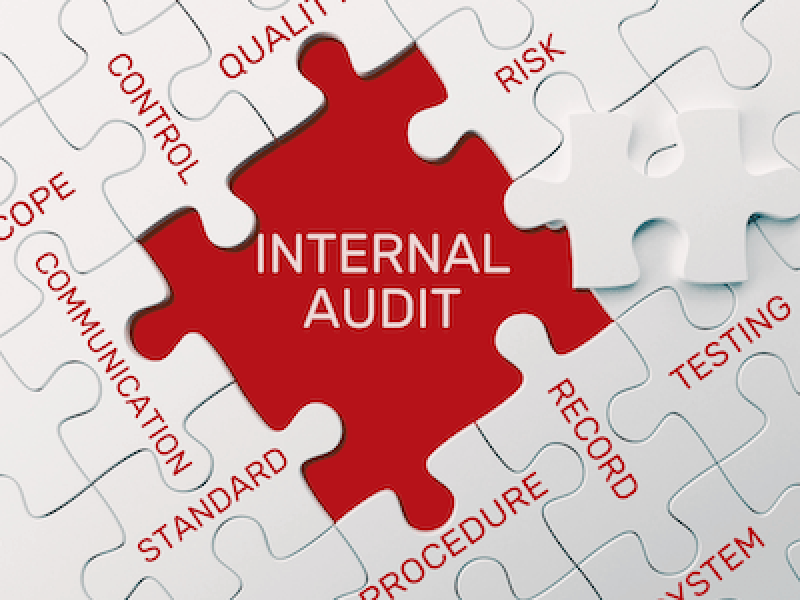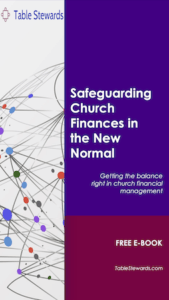Introduction
Growing at the rate of 5% annually, fraud against Christian organisations had reached $55 billion by mid-2021.
And is predicted to reach $70 billion globally by 2025, according to the Status of Global Christianity 2021.
This relates to reported cases, which represent roughly 20% of all church fraud cases.
One common factor that enables such a scale of fraud to be perpetrated against the church is poor segregation of duties.
A lot of opportunities for fraud and misappropriation can be prevented by a simple application of the segregation of duties internal control.
Really? Why then are churches not applying it?
It is for the same reason that internal controls in churches are weaker than in the for-profit sector – trust.
Trust is necessary in churches, and majority of Christians are honest people who can be entrusted to duly steward church finances and assets, seeing these as God’s resources for promoting His kingdom.
However, for the minority inclined towards fraud and theft, churches are seen as soft spots where those who appear to embrace the faith can easily pass as people that can also be trusted with resources and assets.
Controls to protect the church finances and assets, and the entrusted, are not always prioritised thereby exposing the entrusted to temptation and an environment for deliberate fraudulent activities.
Let’s explore what Segregation of Duties is, how it can prevent fraud and error, look at some examples and see how you can assess whether your church or non-profit organisation has adequate Segregation of Duties.
Table Stewards uses a light-hearted scene setting approach to introduce its topics, but if you would prefer to dive straight into any part of the article, please click the relevant link in the table of contents above.
Scene Setting
The Learning & Development Committee (LDC) of The Stable Foundation Church are assembling for their pre-meet with Coach Emmanuel before today’s masterclass.
There is a buzz in the meeting room with Sister Mary reflecting on the last masterclass on internal controls.
Sister Mary: I was so intrigued by the masterclass last week on why internal controls are necessary and how to apply them to protect church finances.
It helped alleviate my concerns over use of church bank cards, as to me, having access to the church bank card is like holding the master key to a safe full of church money!
Sister Jane: Hmm! So that is why you wouldn’t let Brother Badtrus be, and you keep asking questions whenever you hear he bought something for the church with the bank card?
Sister Mary: Well, your words, not mine! However, now that we know what to do to, let’s put the controls in place now. Remember the bible says, “whatever He tells you to do, do it”. I will add – do it quick!
Brother Badtrus: So you cannot only cast assertions, but you can preach too!? Anyway, here comes the Coach. Let’s put an end to this unhelpful chitchat and get the masterclass going!
Coach Emmanuel: Hey! I can see that the internal controls masterclass generated a lot of interest, from the subsequent number of questions and comments that came through.
This week therefore, I want to expand on what Segregation of Duties is, and how it is a very important internal control in protecting church finances. Let’s get going!
What is Segregation of Duties
Segregation (or Separation) of duties is a control aimed at preventing fraud and error by ensuring that no one person is responsible for all parts of a process or transaction.
Which Duties need to be Segregated?
There are 4 main aspects of a process or transaction relating to an asset that need to be segregated and carried out by separate people. These are Custody, Authorisation, Record keeping, and Verification. It is widely acknowledged that separating these 4 components so that a single individual has responsibility for only one component, reduces the risk of error or fraud:
Custody: having custody of the assets e.g. bank card, ability to make online bank transfers and payment, purchase orders, cheque books and petty cash.
Authorisation: being able to authorise the use of the asset. e.g. authorising a request to purchase, cheque signing, or releasing payments.
Record Keeping: keeping records of the assets. e.g. entering transactions in the accounting system.
Verification: reconciling the records to validate the transactions relating to the assets e.g. reconciling bank statements to accounting records of authorised payments.
Segregation of Duties at its basic level is applied to individuals, but can also be applied at a higher level to functions or organisations. For example, the procurement (or purchasing) function that sources and places purchase orders is segregated from the finance function that pays supplier/vendor invoices.
Similarly, an organisation may segregate the duties of capital purchases whereby branches are not allowed to purchase certain capital assets, but this can only be done by the head office organisation.
Each organisation is different in its operations, risks it faces and risk appetite and therefore needs to ensure that its implementation of the Segregation of Duties control helps manage its risks.
The most important consideration is that the components of a process that can enable errors or fraud to go undetected are identified and segregated.
Importance of Segregation of Duties
There are a number of benefits to proper segregation of duties in the financial activities and operations in a church or non-profit organisation. These include:
- Prevention of fraud and error – this is a key outcome of good segregation of duties as explained throughout this article.
- Trust of operatives – knowing that no one is put in a vulnerable position through applying good segregation of duties to processes, helps remove suspicion and mistrust in the operatives entrusted with the segregated aspects of processes.
- Assurance to stakeholders – it is important that members who give to the church have confidence in the ability of the church leadership to protect and manage the church finances towards the fulfilment of the mission and goals of the church.
Knowing that good internal controls exist, including segregation of duties in critical or high risk functions, helps provide assurance.
Example of Segregation of Duties
The table below provides a simple illustration of how Segregation of Duties can be applied to the purchase of goods via a purchase order with suppliers or using a bank card to make an online or physical purchase.
| Who | Activity | Custody | Authorisation | Record Keeping | Verification |
| End User – triggers process. | · Raises Purchase Requisition
· Confirms receipt of goods requested. |
Y | |||
| Person A (could be A1 and A2 if high value) | · Authorises Purchase Requisition | Y | |||
| Person B (or function) | · Places purchase order with supplier/vendor (or makes purchase if using bank card)
· Receives delivery |
Y | |||
| Person C (in finance team) | · Records transaction
· Receives and processes invoice matching with receipt and purchase order (n/a for bank card purchases). |
Y | |||
| Person D (a separate person in Finance team) | · Carries out bank reconciliations. | Y |
Note that Person A triggers the process but is not part of the operators of the process to make the transaction happen. Nevertheless, their role fits in with having custody of the asset and therefore cannot be combined with any other component.
Person C may involve authorisers in the processing of the invoice if there is no process to directly match receipted purchase orders to invoices for payment, but it is assumed here that such a process is in place in this example. This does not apply in the case of bank card purchases.
What to do when Segregation of Duties is not possible
In smaller churches and non-profit organisations with a handful of staff or considerable reliance on a few volunteers, it may not be possible to segregate the custody, authorisation, record keeping and verification of assets and transactions.
In extreme cases, the same person may be responsible for making purchases with a bank card, depositing offerings or collections in the bank, and maintaining the books and records. What happens then?
First and foremost, due to its importance in protecting assets from fraud and error, every effort should be made to always implement segregation of duties.
People in other departments or trusted volunteers can be allocated responsibilities if it helps ensure segregation of duties in key processes.
Even if only 2 of the 3 aspects of segregation of duties can be implemented, then do so, rather than not at all. In such cases, it is important to also implement a compensating control such as monitoring.
So, assuming a member of staff raises a requisition to purchase refreshments for the Sunday school in the forthcoming week. The same staff also holds the bank card to be used in buying the refreshments, and maintains the accounting records. Meaning that Custody and Record keeping are not separated.
There is also a risk that the transaction can go ahead without Authorisation as it just takes using the bank card to make the purchase. There is nothing to prevent unauthorised purchases.
However, the organisation can introduce a policy that requires every purchase to be authorised by a purchase requisition process. In this case, any use of the bank card without an authorised purchase requisition is deemed as an unauthorised activity.
With such a policy in place, a different person such as the Pastor or someone in leadership should authorise the purchase requisition thereby separating Custody and Authorisation.
However, Custody and Record keeping are still not separated.
To compensate, the detective controls of Verification via monitoring and bank reconciliation can be performed by a volunteer on a weekly and/or monthly basis.
The volunteer can review all the transactions that were approved and recorded during the week against the bank statements and supporting documentation, and confirm that they were for valid purposes and within approved limits.
The same volunteer or another person (if available), can perform the monthly bank reconciliation to ensure that all transactions are valid and authorised for church purposes.
In rare cases where there are only two people available, the components of Authorisation and Verification can be performed by one person, and the other can be responsible for Custody and Recording keeping.
Can Segregation of Duties Fail?
Segregation of duties relies on different people performing the 4 aspects of segregation of duties mentioned above – Custody, Authorisation, Record keeping and Verification.
If these 4 components are duly separated, but if the different people (or functions) performing each activity come together to deliberately conceal a transaction or fraudulently carry out a transaction, then the protection of segregation fall downs resulting in fraud and financial loss. This is called Collusion. Read more about Collusion.
Checking the adequacy of Segregation of Duties
Segregation of duties need to be carefully planned and thought through to ensure that the 4 aspects are truly separated, and that the people performing the different duties do not have other conflicting duties or interests.
When people change roles or responsibilities, it is important to re-evaluate processes to ensure that segregation of duties continues to be maintained and new incumbents don’t have conflicting responsibilities e.g. a new bank card holder who retains her former responsibility for authorising requisitions.
Conclusion
Churches and non-profit organisations play an important role in the lives of millions of people around the world fostered by a compassionate approach.
They can also be seen as easy targets for misappropriation of funds meant to foster their good causes.
Segregation of duties is a very important internal control that should not be overlooked in the process of managing entrusted and valuable resources.
If implemented well, it offers good protection against fraud and error.
Organisations however also need to be conscious of what could derail the effectiveness of segregation of duties such as collusion.
Periodic re-evaluation of the operation of segregation of duties especially when there are changes in personnel or responsibilities, also helps maintain its effectiveness to maximise its benefits.








